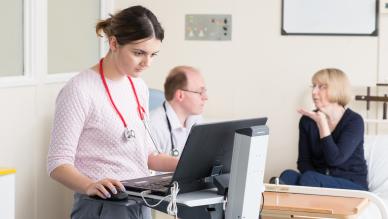

College comments on GMC’s 2025 national training survey
15 July 2025
College comments on GMC’s 2025 national training survey
The Royal College of Physicians of Edinburgh (“the College”) has today responded to the publication of the GMC’s 2025 national training survey, the largest annual insight into the training of doctors in the UK which was based on the views of over 71,000 doctors and trainers.
Key findings include:
- 87% of doctors in training rate their clinical supervision highly (89% in Scotland). 84% said they had a good or very good experience in their post (86% in Scotland).
- 90% of trainers said they enjoy their role (89% in Scotland). However, only 52% can always use their allocated time for training specifically for that purpose (48% in Scotland). 26% of trainees and 29% of trainers also said training was adversely affected because rota gaps weren’t dealt with appropriately (28% and 35% respectively in Scotland).
- 61% of trainees and 47% of trainers are considered to be at moderate or high risk of burnout (56% and 46% in Scotland). 64% of trainees said they always or often feel worn out at the end of the working day compared with 47% of secondary care and 60% of GP trainers.
- 21% of doctors in training reported feeling apprehensive or hesitant about escalating a patient to a supervising clinician (21% in Scotland). This rose to 26% for trainees in emergency medicine and medicine, 27% in obstetrics and gynaecology, and 29% in surgery.
- Of those that completed the optional questions on discriminatory behaviours, 39% of gay and 45% of bisexual trainees (36% and 46% in Scotland) reported hearing discriminatory comments, compared to 24% of heterosexual trainees (25%). 17% of female trainees reported being ignored or excluded, compared to 13% of male trainees (18% vs 12% in Scotland). And 34% of UK graduates from an ethnic minority background report experiencing behaviours like micro-aggressions from colleagues, compared to 25% of their white colleagues (33% vs 26% in Scotland).
In a joint statement the College’s Deans of Training, Dr Kerri Baker and Dr Marion Slater, said:
The majority of doctors in training describe positive experiences in post and rate the quality of their clinical supervision and overall experience highly, which is to be celebrated. However, this year's GMC National Training Survey also highlights key areas for improvement for all involved in delivering and supporting postgraduate medical training. Doctors are an essential part of our workforce and their training is an integral part of NHS work to assure the highest standards of patient care.
We note with concern that over a quarter of resident doctors report that their training is affected by rota gaps, data closely corroborated by trainer feedback. Rota gaps carry risks for patient safety as well as negatively impacting on the ability to train, and create an insupportable mismatch at a time when the UK has increasingly challenging competition ratios and bottlenecks to enter training. Better workforce planning, and government commitment to urgently review training numbers (including a move to WTE recruitment, and expansion where appropriate) is necessary to address this gap to ensure that the future medical workforce can meet the needs of the population, and to avoid losses of UK trained doctors to other healthcare systems.
The above is compounded: a third of secondary care trainers reported insufficient time to train, or not being able to use allocated training time. Senior doctors require adequate protected time embedded in job plans, to support education and training. This is essential for training the next generation. Job plans that bear little true relation to the actual demands upon clinicians should no longer be supported. Training current and future cohorts of doctors is as important as other aspects of service delivery.
Protected training time would help improve the experience of trainers as well as doctors in training, and in turn improve patient care with better supervision and assurance of high standards. Consideration needs to be given to the multiple roles held by senior clinicians working in smaller healthcare facilities, with proportionately fewer experienced doctors, and to ensure that sufficient time is given to senior doctors for essential non-clinical activity, including training. Such facilities are often in the UK's remote, rural and island locations, adding to existing challenges in these settings.
Access to fair and equitable training, free from discrimination and with appropriate support for all doctors, regardless of background is non-negotiable. The College continues to drive change internally and we work with external partners to embed a culture of inclusivity and equity. No doctor, or indeed any healthcare professional, should have to tolerate the micro-aggressions, negative comments or oppressive body language described by over a quarter of resident doctors.
The College will continue to work with its partners to support flexible, person-centred delivery of training programmes with considered placements and rotations to support professional development, as well as doctors' lives outside of medicine. Integration with service and workforce planning is essential to ensure meaningful and sustainable opportunities for career progression. Completion of postgraduate training programmes requires considerable commitment and personal investment from colleagues. Consultant and GP-led patient care improves patient outcomes, ensures efficient use of resources, and optimises training opportunities for resident doctors in training and other healthcare professionals. This must not be eroded by the loss of training time, avoidable rota gaps, or the apparent fixing of temporary gaps via the permanent replacement of doctors by other healthcare professionals in areas where doctors should and can be delivering safe, high quality patient care.
--
The 2025 National Training Survey results are available here: National training surveys - GMC







